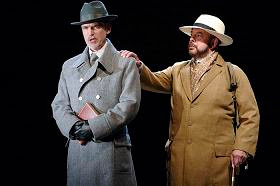
There were several threads weaving through the life of Benjamin Britten: on, more like a hawser than a thread perhaps, was the defence of his being homosexual; this ran parallel to the theme of innocence betrayed. Probably this had something to do with some event in his early life that haunted him for the rest of his days. These two threads merged in his choice of opera plots; Peter Grimes, Albert Herring, The Rape of Lucretia, The Little Sweep, Billy Budd, The Turn of the Screw, Owen Wingrave, and the last one, Death in Venice, recently seen in London and at the Aldeburgh Festival.
The thirties were a difficult time for a middle-class dentist's sone in a seaside town to realise that he was not as other men were, that he was subject to 'desires that dare not speak their name'. BB's extraordinary and precocious musical ability served as a defence against his sexual inclination, likewise his urge to win at games, a 'look at me, Mum'. The same thing accounts for his chumming up with the royals, marrying off his surrogate father's daughter to an Earl (Marian Stein to George Harewood).
Another strong thread was his composing work after work for his longtime partner the tenor, Peter Pears. Most of the operas, song-cycles, canticles, cantatas, a score of scores. I think that Ben knew that his insistence on finishing Death in Venice before submitting to a heart operation was dicing with death (in Suffolk 1976). And, by the time of composing that last opera (with a massive central part for Pears), the battle for homosexuality had been won. Gone the anxious days when the bourgeois Suffolk man was summoned to Scotland Yard for questioning and warning.
But there it is, Death in Venice exists, his final act of the defence of the Homosexual Realm, hitched to Thomas Mann's novella of an artist who becomes infatuated with a young boy. The opera is not entirely successful, marred by the passages in which occur the highflown Appolonian glorification of the boy Tadzio and his friends prancing about the Lido. As Blake wrote, "Damn braces, bless relaxes"; in other words, evil is easier to portray than good. Myfanwy Piper's libretto (Britten no doubt conniving) sometimes seems, as my colleague Hilary Finch put it in her Times review , like "research notes for a first year course in philosophy and aesthetics". How many times does the artist Aschenbach utter, "My mind beats on"?
However there is plenty to admire and be moved by in Death in Venice, particularly the orchestral parts, the ingenious as ever orchestration, and episodes like the two visits to the barber's (although the film by Visconti sensibly condenses the two into a single one). Ah yes! The film. Wisely or not, this sixtieth Aldeburgh Festival featured the film as well as the opera. I shall probably be drummed out of the town for writing that, in many ways, the film tells the story better, not so wordy, more condensed.
With time, Alan Oke will probably acquire more authority and gravitas in his portrayal of Aschenbach. Already, he sings the music and puts the words across brilliantly, but he does not suggest an artist distinguished in the eyes of the world. Peter Sidhom has a fine voice and bearing as the malevolent Traveller but the director reduces the shock we should feel at his recurrent appearances by having him change his appearance and clothes on stage. Otherwise, there can be nothing but praise for the Japanese director, Yoshi Oida. The brick walls of Snape Maltings are left bare and we are mostly to imagine Venice, aided by lighting and a five foot screen that shows appropriate film; there is real water, real oars, but no gondola. The prancing and dancing of the boys is well done, but Tadzio's looks are plain, so that one wonders at Aschenbach's desires. Paul Daniel conducted the Britten-Pears Orchestra and the student players did fine things under his direction. Could the ends of both acts have been more pointed? Probably.
